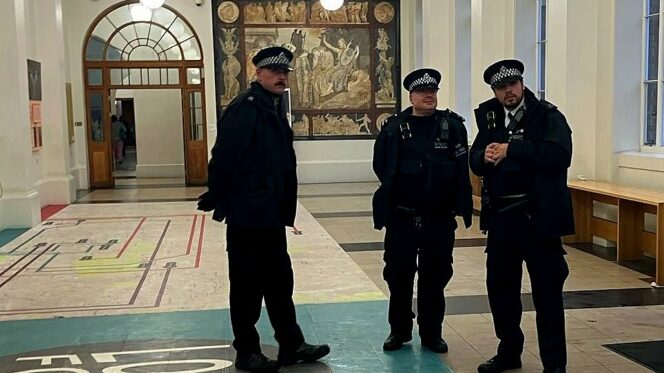Government Advisor Suggests Palestine Protests Could Be Treated Like Sectarian Parades in Northern Ireland
And wants to create a new form of proscription for activists.
by Simon Childs
13 December 2023

The government’s independent advisor on political violence and disruption could recommend the creation of a Northern Ireland-style body with the power to curtail pro-Palestine demonstrations.
Discussing the response to recent pro-Palestine demonstrations in central London at a home affairs select committee on Tuesday, John Woodcock said, “One proposal which is being circulated” asks the questions, “Is simply resting this on the shoulders of the chief constable of the Met and other forces sufficient? Could you look at the kind of structure that you’ve had in Northern Ireland over where parades should go over a prolonged period of time? And should you be widening out that decision-making apparatus?”
Northern Ireland has a commission which was set up in 1998 to place restrictions on contentious unionist Orange Order parades, which threatened to upset the peace process in the country following decades of sectarian violence. The commission can restrict the routes of marches – which historically sometimes went through republican areas – or restrict what music is played.
The suggestion that this framework is relevant to the current debate around protests for Palestine was criticised by Colum Eastwood MP for Foyle and leader of the SDLP, the social-democratic Irish-nationalist party in Northern Ireland.
He told Novara Media, “The parading framework introduced in Northern Ireland was about respecting human rights and ending conflict. It is the complete opposite of everything this Tory government has tried to do with public order policing and their approach to protest which is about silencing dissent and fomenting division.
“There is a lot this government could learn from institutions designed to place human rights at the core of their operation, but I have no confidence that the Tories have any interest in that hard work.”
John Woodcock, who was ennobled as Lord Wanley in 2020, quit the Labour party in 2018, claiming that it had been “taken over by the hard left” under Jeremy Corbyn and “tolerated” antisemitism. Woodcock was previously chair of Progress, a Blairite group within the party, and is a former chair of Labour Friends of Israel. He was asked by Boris Johnson to conduct a review into political violence and disruption in 2021.
Woodcock’s review was nearly complete before the Hamas attacks on 7 October and he agreed to update it given the mass protests that have happened since. He told the Telegraph that he would be specifically “looking at the threshold for the police to ban a march”, saying that British Jews are facing an “explosion” in antisemitism, linked to pro-Palestine marches. His comments at the select committee offer a glimpse into the kind of recommendation his report could end up making.
The comments follow remarks made in November by former home secretary Suella Braverman, who wrote in an article for the Times that Palestine marches resemble an “assertion of primacy by certain groups – particularly Islamists – of the kind we are more used to seeing in Northern Ireland”. She received angry criticism and was accused of “aggressive ignorance” after she clarified via a source that she was referring to “dissident republicans”, after it was initially assumed she was talking about Orange Order marches by unionists.
Braverman had pressured the Metropolitan police to ban the march for Palestine that coincided with Remembrance Day, but police intelligence did not suggest that there would be the kind of serious disorder that would meet the threshold for a ban.
Since the start of the mass demonstrations for Palestine, rightwing media, politicians and government advisors have whipped up tensions, claiming that they are overwhelmingly antisemitic and pro-terrorism, culminating in far-right violence at the cenotaph on Armistice Day, while a national march for Palestine happened a mile away.
Chief constable Chris Haward, gold commander for Operation Tarlac – the name for the policing response to the Israel-Palestine conflict – told the committee that while protests and social media have caused fear among the Jewish community as antisemitisic incidents rise, “general media” has “been shown to be probably the most influential in terms of driving that fear”.
Woodcock also suggested making a new category for protests that don’t reach the threshold of terrorism, because of protest group Palestine Action, which has targeted weapons factories to disrupt the arms trade.
He said: “If you look at the proscription under terrorism, you look at the bar that has been placed on that, it is very high – you can understand why ministers wouldn’t go there. So I’m actively looking at, could there be effectively a new category or a different category of proscription […] certainly a way of being able to place significant restrictions on an organisation who very openly advocate breaking the law to get its way.”
Jun Pang, policy and campaigns officer at Liberty, said: “Protest is our fundamental right – not a gift from the state. We all have the right to stand up for the things that matter most to us – but this government has repeatedly used moments of crisis to clamp down on our ability to make our voices heard.
“These proposals are concerning, and if adopted, they could further limit our right to freedom of expression, including our right to protest.
“Any government that professes to care about free speech should be protecting our rights – not stripping them away. The government should not be passing new laws to restrict protest.”
Simon Childs is a commissioning editor and reporter for Novara Media.


